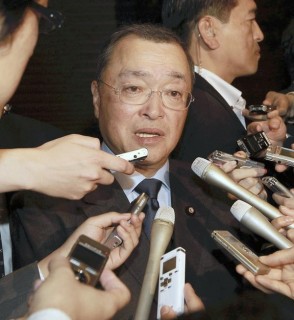Loading
Search
▼ New economy minister faces energy, tax challenges ahead
- Category:Other

THEJAPANNEWS
Yoichi Miyazawa, the new economy, trade and industry minister, will immediately face many important and difficult challenges over energy policies.
Miyazawa succeeded Yuko Obuchi after she resigned Monday.
The government should establish prospects for the reactivation of nuclear power plants within this year, and also needs to draw up future visions for the nation’s energy policies.
In addition, reforms on corporate tax systems for revitalizing the economy and measures to better utilize women in the workforce are urgent tasks, about which the government has no time to waste.
“I really feel they are very serious tasks,” Miyazawa told reporters at the Prime Minister’s Office, when his appointment was decided on Monday, in regard to the many difficult hurdles in energy policies.
Miyazawa will have to cope with the problem of the reactivation of Kyushu Electric Power Co.’s Sendai nuclear power plant.
Currently, procedures to obtain the support of local residents for reactivation are making progress. Obuchi planned to visit Sastumasendai, Kagoshima Prefecture, where the nuclear power plant is located, and nearby municipalities to explain the necessity of reactivating the power plant.
As a precondition to give consent to the reactivation, many in Kagoshima Prefecture have voiced a desire that the economy minister will visit the prefecture and offer explanations of why the reactivation is necessary.
Officials in the Economy, Trade and Industry Ministry had expected positive results from Obuchi doing so, saying, “As [Obuchi] has a soft image and is popular among women, local residents’ understanding may deepen.” But the plan now has to start over.
Miyazawa, after taking the post of minister, will likely visit the prefecture sometime in the near future.
Miyazawa said: “Because the opinions of local residents there are very important, I’ll of course hold various forms of discussions.”
However, if Miyazawa makes mistakes in the way of explanation, it may draw antipathy from the local residents, and thus he will be required to act extremely carefully.
Setting renewable energy prices
It is also an urgent task to reexamine the feed-in tariff system to purchase electric power generated by renewable energy resources at fixed prices. The system was introduced aiming to encourage the proliferation of solar power and other renewable energy resources.
The system was introduced in July 2012 and has guaranteed large profits for operators of solar power generation plants.
Therefore, output volumes from solar power generation have been much higher than the government’s projection, and confusion is spreading. For example, major utilities suspended new applications for electric power from solar power generation. The ministry aims to compile stop-gap measures by the end of this year.
Another task is whether or how aged nuclear power reactors will be decommissioned, as Obuchi recently asked the electric power industry to quickly decide whether seven aged nuclear reactors should be decommissioned.
On Friday, Obuchi told the electric power industry to judge how to deal with the seven reactors that will be 40 years old or older since the start of their operation as of July 2016.
If electric power companies decide to decommission the nuclear reactors, the power generation facilities will not be regarded as assets. Thus, the electric power companies will have to post huge losses at once under accounting rules.
The electric power companies may postpone decisions on decommissioning the reactors in fear of the consequences. Thus, it is necessary to make arrangements that will allow the electric power companies to smoothly decommission the aged rectors.
Reforming corporate tax
Miyazawa will also be tested over how to engage in the reforms on corporate tax systems as the economy minister. Practical actions over the issue will be decided late this year.
Prime Minister Shinzo Abe voiced high expectations for Miyazawa, saying: “He has a lot of knowledge about policies and was a key player in the Research Commission on the Tax System [of the Liberal Democratic Party]. Including taxation, which places importance on economic growth, I want him to steadfastly promote our economic growth strategy.”
The economy ministry and the Finance Ministry are at odds over practical measures to cover tax revenue falls due to lowering the effective corporate tax rate starting in fiscal 2015. The economy ministry wants to reduce the burdens on companies as much as possible, but the Finance Ministry puts its priority on securing tax revenues.
Some in the economy ministry have voiced concern because Miyazawa was formerly a Finance Ministry bureaucrat and a member of the LDP tax commission. One ministry official said, “We feel anxious about whether [Miyazawa] will speak for companies’ interests.”
But a senior official of the Finance Ministry who knew Miyazawa well at the time he worked at the ministry said: “Because he is a great source of ideas, it’s likely that he will proactively hammer out economic policies, while placing importance on fiscal discipline.”
- October 22, 2014
- Comment (0)
- Trackback(0)

